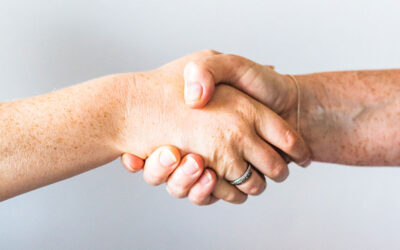According to Alfred Adler, one of the fathers of psychology, almost all our problems derive from interpersonal relationships: if you think about it, all our emotions derive from something that, from our point of view, does not work in relationships with others.
In the workplace, in fact, others can represent a danger, for example when we enter into negative competition with them and develop a sense of inferiority, or when we perceive our colleagues as a threat to our well-being.
Sometimes when our vision crystallizes in seeing others as a danger it can become extremely difficult to change our experience, or even just realize the most important factor, which is that how we perceive others depends exclusively on us.
But how, some might argue, if my colleague is gossiping about me is objectively damaging me, it’s not my fantasy. Certainly, but the management of our relationships is always under our control and it is always possible to transform a relationship of enmity into something different.
Let’s see in practice how to do it.
First of all, we can try to ask ourselves: how many of the people we deal with do we consider to be hostile in some way? Starting from the stranger at the traffic light that rings behind us up to the closest relatives, passing through work colleagues.
If the number of those we consider “enemies”, that is all those towards whom we have negative feelings because we feel that we have suffered some form of attack, is a high number then we may already have a valid indicator that our vision of reality is distorted. , and that we interpret it negatively.
It is clear that people are not “all bad” and that the city is not populated by evil individuals who are angry with us. In part it is our vision of reality that creates our perception, even if, as we will see, this is not the only reason.
The good news is that the way we see things is always under our control and therefore it is always possible to change it.
To recap: the first step is awareness, the second is to change your vision.
A third aspect to consider is our own behavior. In fact, it can happen that people objectively behave badly towards us, apparently for no reason. One wonders, however, to what extent their behavior is determined by ours. In fact, humans tend to be led to “mirror” aggressive behaviors. If you think about it it is quite intuitive: if someone insults you, your reaction will probably be to insult him in turn. It’s natural, it’s a kind of survival instinct.
What if we were the first to attack, without really realizing it? Just think of that supermarket cashier who answered badly and did not accept the expired stamps, when perhaps you were the first to address him in a rude tone or with disdain: his was nothing more than a spontaneous reaction. Give it a try, the next time you go shopping greet the cashier with a smile; you will notice that he will almost certainly smile back as well, since luckily the reverse principle also works.
Even if we are attacked, if you think about it, nobody forces us to respond on the same level of aggression as our interlocutor. As the Buddha said: “If you get angry with me and I don’t take offense, I don’t take it (your anger), it falls on you. You will be the only one who becomes unhappy, but not me. Everything you’ve done, you’ve done to yourself. ” Think about it, the next time they ring you at the traffic lights.
So awareness, world view and behavior are the first three elements to not consider others as enemies. But how to even turn them into allies?
To understand this step we must identify what distinguishes an enemy from an ally: the enemy is someone who wants something from us, our attention, our energy, our power and so on. The ally, on the other hand, is someone who offers us something: his attention, his friendship, his help, etc.
Simply to transform others into allies we must apply the same principle of smiling at the cashier and become the first allies for others, offering them what we are able to offer. Obviously without overdoing it and without canceling ourselves, but creating a balance and respecting our borders and our limits.
However, get out of a do ut des logic: if we expect to receive a return, our “giving” will have an energy, an unpleasant “taste” and the other will be led to notice it, if only at an unconscious level, and not will never be our ally. When people receive something selflessly they tend to give back more generously than what they have received.
So change your view of things and be the first allies of others, you will notice the world change with you.
Altri articoli
Less stress and more energy thanks to Trust Management
Any corporate context is formed in its fundamental essence by the relationships that develop and define it. And every human relationship is based on the presence (or lack) of trust. This is why it is so important to know how to evaluate, support, improve and develop...
How to get the most out of synergies thanks to collective intelligence
Every group, as we know, forms within itself an entity that is greater than the sum of its parts. But how is it possible to exploit this added value without it becoming, as often happens in the company, a dispersive and inefficient movement? One of the simplest and...
Reduce accidents by changing the perception of the concept of safety
Several studies have shown that business accidents are due in 80% of cases to human errors. Starting from this data, it is obvious that to reduce injuries it is more appropriate and effective to start from the analysis of human behavior, to then understand how to...
How to break free from competitiveness with colleagues
We have all perceived, at least once in our life (and perhaps much more than one) a sense of competitiveness; in reality, if you pay attention to it, you will find that competitiveness affects us in almost all life situations, from social ones, in which we want to...
Enhance intuition in the company thanks to the Management Constellations
What do Barak Obama, Albert Einstein and Elon Musk have in common? It goes without saying that they are characters of great intelligence, but what really unites them is their great capacity for intuition. Why is intuition important in the company? Intuition is...
How to write great emails
We now manage them automatically, every day, constantly; they are part of our life, of our routine, they determine our way of working, our relationships, our communication. Yet we don't give them so much importance, sometimes we respond automatically and open them...
Courage in the company: the key to your success
"Having courage" in your business environment means much more than "throwing yourself" or "taking risks", having courage is a concept that has a profound value, it has to do with our identity and the meaning it has for we our life in terms of personal fulfillment. An...
Mindfulness as a resource to work better and with less effort
In recent years you have often heard about mindfulness and the benefits it brings, both personally and professionally, for those who practice it consistently. But exactly why can it be beneficial for our well-being in the workplace? What concrete benefits can it bring...
Developing well-being in the company through emotional intelligence
Everyone talks about IQ, but there is another type of intelligence, equally important because of its enormous impact on our well-being and our decisions: emotional intelligence.First theorized in 1990 by Daniel Goleman, IE can make a difference in the workplace,...
Stop to go faster: how smart breaks can boost productivity
Let's face it: in 2022 the idea that to get the most we must squeeze as much as possible for eight consecutive hours (or more) is no longer credible.Numerous studies confirm that an employee engaged for 8 consecutive hours will see his performance curve drop...











